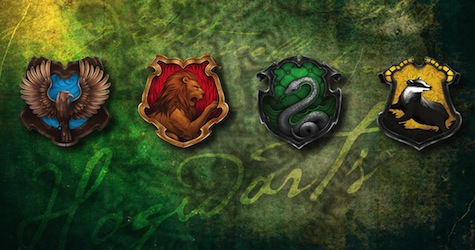Whether it’s through an online personality test, or conversations with friends, or simply in the privacy of their own head, it’s a question every Harry Potter fan has asked themselves: “Which house would I be sorted into?”
“Will I be put with the brainiacs of Ravenclaw? The heroes of Gryffindor? The villains of Slytherin? The… others of Hufflepuff?”
But, guys, it’s been fifteen years since Harry Potter and the Sorcerer’s Stone was published. Can we finally admit that the Hogwarts Houses are terrible stand-ins for personality types?
For one thing, there’s an evil house. Slytherin has no virtues associated with it. Yes, in the first book the Sorting Hat says Slytherin is for the ambitious, but in fact most Slytherins, like Draco Malfoy, have no ambition. They want to remain the privileged elite of the wizarding world, and so they try to keep out lesser wizards for fear of diluting their financial, political, and mystical power. Slytherin is, in short, the racist house.
That leaves only three houses that are actual personality types, Hufflepuff (hard-working), Ravenclaw (smart), and Gryffindor (brave). But the problem there is that all of our heroes live in Gryffindor, so if you identify with any of the three protagonists—especially Hermione Granger, the smartest, hardest-working witch at Hogwarts—you probably also identify as a Gryffindor. So we have a system where one of the houses is just better than the other three, in which all the virtues reside.
The Hogwarts Houses, roughly, line up with the four classical elements and their related virtues: fire and bravery, air and intellect, earth and practicality, and water and compassion. Except that in J.K. Rowling’s world being smart and hard-working isn’t as important as being brave, and the idea of compassion as a virtue is non-existent. Which means using the Houses as personality types results in a lot of false positives for Gryffindor, while an entire personality type is left on the wayside.
![]()
The idea of the four different personality types is done so much better in other stories. In Avatar: the Last Airbender , the four personality types are all on display in the four main benders, the spiritual, problem solving airbender Aang, the healing, compassionate waterbender Kitara, the no-nonsense asskicking earthbender Toph, and the firebender Zuko, whose bravery takes the form of a fierce determination to find the avatar, no matter the cost. But even there, as the hero of the story, Aang’s airy disposition is privileged.
Even better is the Fantastic Four, because they are ALL heroes of equal standing, so there’s no privileging of one virtue over another, and their family dynamic illustrates how the virtues work together. Johnny Storm, the Human Torch, is bravest, rushing headlong into danger, but it’s a foolish bravery that gets him into trouble. Reed Richards, Mr. Fantastic, is the smartest man in the world, but can get lost in his own mind without his family to ground him. Ben Grimm, The Thing, can clobber any foe and accomplish basically any feat of strength, but his dour disposition requires the others to inspire him. And Sue Storm, the Invisible Woman, keeps her family together through love, compassion, and protection.
Asking, “which Hogwarts House do I belong to?” is one quarter asking “am I a racist?” and one quarter asking “am I the protagonist of my own life?” But asking “which member of the Fantastic Four am I?” is asking “how do I solve problems? Do I rely on my head, my heart, my gut, or my hands?” Inherent in the question is the statement “I am a hero,” and recognizes that there is no one “best” personality. We can all be heroes, each in our own way.
Steven Padnick is a freelance writer and editor. By day. You can find more of his writing and funny pictures at padnick.tumblr.com.










